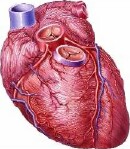- Could Your Grocery Store Meat Be Causing Recurring UTIs?
- Are You Making This Expensive Thermostat Error This Winter?
- Recognizing the Signs of Hypothyroidism
- 10 Strategies to Overcome Insomnia
- Could Artificial Sweeteners Be Aging the Brain Faster?
- Techniques for Soothing Your Nervous System
- Does the Water in Your House Smell Funny? Here’s Why
- Can a Daily Dose of Apple Cider Vinegar Actually Aid Weight Loss?
- 6 Health Beverages That Can Actually Spike Your Blood Sugar
- Treatment Options for Social Anxiety Disorder
Scientists Spot Mutation Behind Genetic Form of Heart Failure


Researchers have uncovered a major genetic risk for heart failure — a mutation affecting a key muscle protein that makes the heart less elastic.
The mutation increases a person’s risk of dilated cardiomyopathy. This is a form of heart failure in which the walls of the heart muscle are stretched out and become thinner, enlarging the heart and impairing its ability to pump blood efficiently, a new international study has revealed.
The finding could lead to genetic testing that would improve treatment for people at high risk for heart failure, according to the report published Jan. 14 in the journal Science Translational Medicine.
The mutation causes the body to produce shortened forms of titin, the largest human protein and an essential component of muscle, the researchers said in background information.
“We found that dilated cardiomyopathy due to titin truncation is more severe than other forms and may warrant more proactive therapy,” said study author Dr. Angharad Roberts, a clinical research fellow at Imperial College London. “These patients could benefit from targeted screening of heart rhythm problems and from implantation of an internal cardiac defibrillator.”
About 5.1 million people in the United States suffer from heart failure. One in nine deaths of Americans include heart failure as a contributing cause. And about half of people who develop heart failure die within five years of diagnosis, according to the U.S. Centers for Disease Control and Prevention.
In this study, researchers studied more than 5,200 people, including both healthy people and people suffering from dilated cardiomyopathy. The researchers performed genetic sequencing on all these people, examining the specific gene that the body uses to create titin.
Prior research had found that genetically shortened titin is the major genetic cause of dilated cardiomyopathy, accounting for about 25 percent of severe cases, according to the paper.
However, there are numerous mutations of the titin gene and many never lead to heart failure, so the researchers focused on those variations that occur most often in people with dilated cardiomyopathy.
They uncovered a specific type of titin mutation that occurs in families and appears to greatly increase the risk of dilated cardiomyopathy (DCM). “Found in a patient with severe and familial DCM, then 49 times out of 50 this mutation is the underlying cause,” Roberts said.
Researchers also discovered that the mutation causes much more damaging heart disease.
“We compared the hearts of patients with and without titin mutations using state-of-the-art MRI scans, and we also followed their progress in the clinic,” said study co-author Dr. James Ware, a clinical lecturer in cardiovascular genetics at Imperial College London. “We found that patients with dilated cardiomyopathy due to titin mutations had more severe disease, with more life-threatening heart rhythm problems and ultimately poorer survival than other patients with dilated cardiomyopathy.”
Up to now, genetic testing for heart failure has been difficult because it’s been hard to interpret which mutations might lead to heart disease, Roberts said. These findings could better help doctors figure out which people are at greater risk for heart failure — especially those who have a family history of the disease.
“This is really sort of a change in the landscape of genetic testing for dilated cardiomyopathy because it accounts for a much larger proportion of cases than any of the other genes identified today,” she said.
Future research will focus on how the mutated titin appears to “poison” the heart muscle, said Dr. Christine Seidman, a geneticist at Harvard Medical School in Boston.
“If we understand those signals, we would like to further identify ways to attenuate those signals or stop them,” Seidman said. “That clearly would allow directed therapeutics that would provide great benefit to patients with these titin truncations.”
More information
Visit the U.S. National Institutes of Health for more on heart failure.
Source: HealthDay
Copyright © 2026 HealthDay. All rights reserved.










